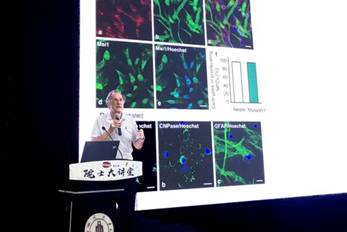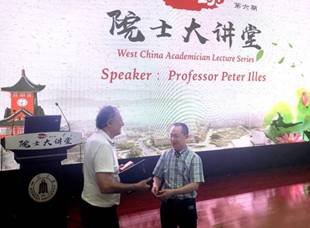At 10:30AM on May 17th, the 6th“Huaxiba Academician Lecture Series”, which was sponsored by West China Medical Center, co-organized by West China School of Basic Medical Sciences & Forensic Medicine and medical colleges/hospitals, was held in the Academic Reporting Hall of Yifu Basic Medical Building. The guest speaker, Dr. Peter Illes, is a member of the European Academy of Sciences. Approximately 100 teachers and students mainly from West China Medical Center were attracted to attend the presentation. Prof. Yong Tang (Vice Dean of the Institute of Chinese Medicine Innovation of Chengdu University of Traditional Chinese Medicine) and Prof. Xiaoheng Liu (the president of Professor's Committee in our school)were present at the meeting. This meeting was presided over by Prof.Changlong Li, the secretary of the Party committee of our school.

Professor Li thanked Dr. Illes for his visit. After a brief introduction to the academic achievements and contributions of Dr.Illes, Secretary Li said that it was a pleasure to invite Dr. Illes from the European Academy of Sciences to give a speech, which would help to improve the level of communication and cooperation in all aspects, to expand students' international vision, and to build a better campus culture.He also pointed out that this meeting is an important reflect of carrying out open-door schooling in our school.
Dr. Illesfirstly gave a brief introduction on purinergic receptors, including the family members and their functions. And then he described their research on purinergic receptors in adult neural progenitor cells.Dr. Illes’s group had found that the activation of functional purinergic receptors was involved in the physiological processes, including proliferation, migration, differentiation and apoptosis, in adult neuronal progenitor cells. They further demonstrated that purinergic receptors P2X7 could induce necrosis or apoptosis of neural progenitor cells in the subventricular region.Afterwards, Dr. Illeelaborated on the function of purine signals during epileptic seizures. They found that pilocarpine or kainic acid-induced status epilepticus up-regulated the functions of purinergic receptors P2Y1 and P2X7 in neuronal progenitor cells. They also found that pilocarpine or kainic acid-induced epilepticus up-regulates the function of purinergic receptors P2Y1 and P2X7 in neural progenitor cells, and the activation of P2Y1 would increase the proliferation and migration of neuronal progenitor cells, while the pathological proliferation would be limited by P2X7-induced apoptosis of neural progenitor cells. Finally, Dr. Illes introduced thatin vitro-cultured hippocampal slices could represent status epilepticus by treating with 4-aminopyridine. While in this progress, DG neurons released a large amount of ATP to act on neural progenitor cells, which provided a good model and perspective for further study of epilepsy.

Dr.Illes gradually explained the research process of their team,encouraging everyone to actively think and make unremitting efforts on the scientific research. Afterthe presentation,the faculties and students discussed related questions withDr.Illes.

Prof. Xiaoheng Liu, the president of Professor's Committee of our school, made a concluding speech. He thanked Dr.Illes again for his visit. Prof. Liu hoped that we could strengthen cooperation in scientific research and personnel training, which would comprehensively enhance the internationalization level of our school.
Brief introduction to the speaker:
Dr. Peter Ille is a member of the European Academy of Sciences, associate editor of Purinergic Signalling, and editor of Current Neuropharmacology. Dr. Ille is a founder and the first president of German Purine Club. He is also a leader of German Science Foundation (Deutsche Forschungs gemeinschaft, DFG) and German P2 Receptor Research Project (The German Research Unit "Neuronal and glial P2 receptors; molecular basis and functional significance"). Dr. Ille established an international cooperation network in the field of purine around Leipzig, Aachen and Berlin. Dr. Illeis an internationally recognized leader in the field ofpurinesignal research and has published more than 230 academic articles in journals,such asNat Commun, Trends Pharmacol Sci, Progress of Neurobiology, Neuroscientist,andCereb Cortex.